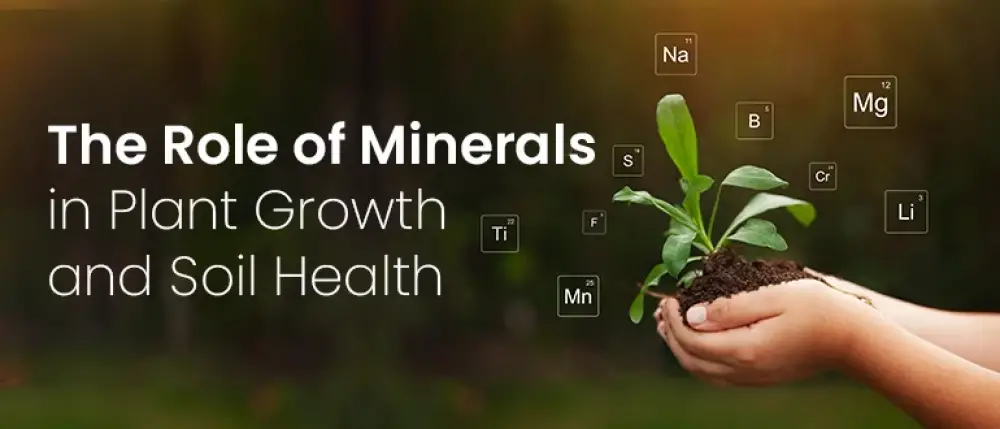Minerals play a crucial role in promoting plant growth and maintaining soil health. Adequate mineral levels are essential; their deficiency can lead to leggy growth, yellowing leaves, and overall soil impoverishment. Hence, maintaining a balanced quantity of primary minerals in the soil, like magnesium, calcium, iron, phosphorus, nitrogen, and others, is vital for supporting a healthy plant metabolism. To learn more about how minerals contribute to plant growth and soil vitality, continue reading the following article.
Important Minerals For Plant Growth and Soil Health
Minerals are an essential component of nutrients. However, a healthy level of minerals alone does not ensure plants’ sustainable growth. There are some other vital components of nutrients as well, and their shortage can inhibit plant growth and impoverish the soil. The following are the primary minerals needed for the holistic well-being of plants:
Nitrogen
Nitrogen exists in soil in organic form. It is highly beneficial for plant growth, as plants supplied with adequate nitrogen grow healthy and produce large amounts of green foliage.
Conversely, a nitrogen-deficient plant generally takes a longer time to grow. Their fruits, leaves, and shoots remain smaller than those of a nourished plant. Therefore, it is essential to treat plants with fertilisers and foods that are rich in nitrogen.
Nurseries and gardeners usually use fertiliser and food containing nitrogen. Furthermore, the pH level in soil should be increased for better absorption of minerals in plants.
Phosphorus
Phosphorus is one of the most essential minerals for plant growth. It is found in phosphate rocks and soil, is responsible for plant cell division, and helps plants grow normally. It also promotes water usage efficiency and tillering. However, it is difficult to diagnose phosphorus deficiency.
But if the plant starves from phosphorus deficiency at the seedling stage, its growth is restricted. Furthermore, phosphorous deficiency causes dark green leaves and purplish veins. To prevent this, you can use animal manure, green manure, compost, or rock phosphate.
Calcium
Another vital mineral essential for plant and soil growth is calcium. According to soil mineralogy, it increases the strength of the soil to hold water and minimises water logging. It boosts the formation of strong cells and ensures that plants' nutrients do not escape their cell membranes. Furthermore, this mineral is vital for preventing plant diseases.
Calcium deficiency can greatly inhibit plants’ growth. Additionally, the first symptoms appear on younger leaves and tissues. Leaves may look small and crinkled, and veins may also turnbrown.
To treat this , lime milk, crushed eggshells, and gypsum can be used in the soil. Calcium-containing fertiliser is also an effective treatment.
Magnesium
Magnesium is another vital mineral found in soil. It improves soil structure and ensures the healthy development of chlorophyll molecules in plant tissues. It also ensures that plants have active enzymes to sustain their metabolism.
The low level of Mg in the soil can impact the plant’s growth negatively. The first sign of deficiency is discolouration of leaves due to a chlorophyll shortage. Moreover, when the deficiency is critical, the area between the veins of leaves may turn yellowish.
To combat this issue, apply a magnesium leaf spray, such as Epsom salts, or a calcium-magnesium carbonate solution. This is highly preferable in the autumn or winter seasons.
Sulphur
Sulphur is a vital mineral that ensures adequate plant development and growth. It contains protein disulphide bonds, vitamins, and amino acids. Using sulphate transporters (bacteria and fungi), plants uptake sulphur from the soil and promote a healthy metabolism. However, this mineral is rich in soil and is presented in an organic form. Due to this, most of the quantity is inaccessible for plant growth.
Plant sulphur deficiency can raise major issues in their growth cycle. It can give birth to chlorosis, which can crop up in younger and older plants. The first sign is that the leaves may appear light green. To treat the issue of sulphur deficiency in plants, animal manure, compost, and ammonium sulphate can be used.
Iron
Iron plays a significant role in metabolic processes such as photosynthesis, respiration, and DNA synthesis. It maintains the balanced chloroplast structure in plants and activates enzymes for sustainable plant metabolism.
However, the imbalance in the iron mineral can result in iron chlorosis in plants. The new leaves that come at the top of the plants start to turn yellow first. Overall, it inhibits plant growth completely. Applying composted organic matter to the soil at the topmost part of the plant's roots is advisable.
Zinc
Zinc is a vital mineral that ensures the speedy development of plants. It works with enzymes to nourish plants with essential growth hormones. It also produces amounts of chlorophyll and proteins, vital for many other plant metabolic processes.
However, in the case of zinc deficiency, it can inhibit their growth. Furthermore, their efficiency in producing larger leaves, shoots, and fruits decreases.
To cure the problem of zinc shortages in plants and soils, use zinc-rich soil and a micronutrient spray for the plants. Moreover, ensure that there is no waterlogging in plants, as waterlogging is a major cause of mineral depletion in soil.
Wrapping Up!
Caring for plants involves understanding the importance of minerals for their growth and soil health. Ensuring your plants receive adequate minerals prevents leggy growth, yellowing leaves, and poor soil quality.
Disclaimer: The above information is for reference purposes only. Kindly consult your general physician for verified medical advice. The health insurance benefits are subject to policy terms and conditions. Refer to your policy documents for more information.
